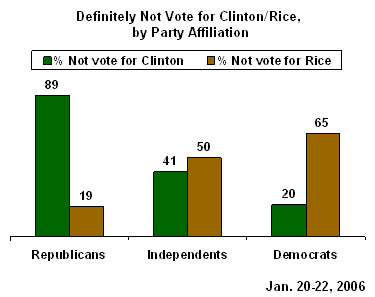GALLUP NEWS SERVICE
PRINCETON, NJ -- A new CNN/USA Today/Gallup poll finds the two women who are most frequently mentioned as potential presidential candidates of their respective parties are each opposed by about half the electorate. Among registered voters, 48% would consider voting for New York Sen. Hillary Rodham Clinton for president in 2008, including 16% who say they would "definitely" vote for her. Fifty-one percent say they would "definitely" not vote for Clinton.
Slightly more positive feelings are found for Secretary of State Condoleezza Rice. Fifty-two percent would consider voting for her for president, including 14% who would "definitely" commit. Forty-six percent say they would "definitely" not vote for Rice.
Next, I'm going to ask you about some people who may run for president in 2008. For each one, please tell me whether you will definitely vote for that person, whether you might consider voting for that person, or whether you will definitely not vote for that person. How about -- [ITEMS ROTATED]?
A. Hillary Rodham Clinton
|
|
Definitely |
Might |
Definitely not |
No |
|
Registered voters |
||||
|
2006 Jan 20-22 |
16% |
32 |
51 |
1 |
|
|
|
|
|
|
|
National adults |
|
|
|
|
|
2006 Jan 20-22 |
17% |
33 |
49 |
1 |
B. Condoleezza Rice
|
|
Definitely |
Might |
Definitely not |
No |
|
Registered voters |
||||
|
2006 Jan 20-22 |
14% |
38 |
46 |
3 |
|
|
|
|
|
|
|
National adults |
|
|
|
|
|
2006 Jan 20-22 |
14% |
38 |
45 |
4 |
More Republicans are opposed to Clinton than Democrats are opposed to Rice. But more independents are opposed to Rice than to Clinton.
Eighty-nine percent of Republicans say they would "definitely not" vote for Clinton, compared with 65% of Democrats who feel that strongly against voting for Rice. About the same number of each party say they would definitely not vote for their own party's female candidate -- 19% of Republicans "definitely" against Rice, and 20% of Democrats "definitely" against Clinton.
Clinton makes up some, but not all, of the difference among independents, who show more opposition to Rice (50%) than to Clinton (41%).

Survey Methods
Results are based on telephone interviews with 1,006 national adults, aged 18 and older, conducted Jan. 20-22, 2006. For results based on the total sample of national adults, one can say with 95% confidence that the maximum margin of sampling error is ±3 percentage points. In addition to sampling error, question wording and practical difficulties in conducting surveys can introduce error or bias into the findings of public opinion polls.